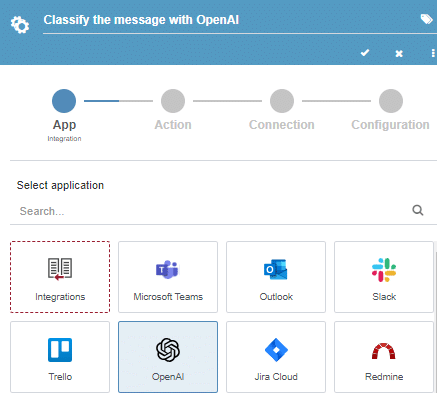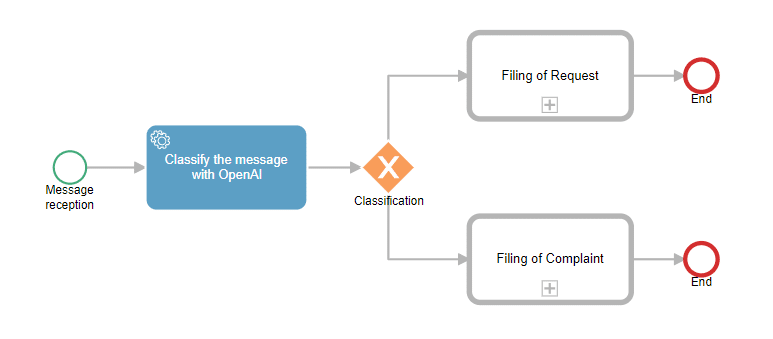Artificial intelligence is the leading technological trend, and process management is no exception. Today, business processes require agility and precision that AI optimally facilitates, providing companies with significant operational and competitive advantages.
In our commitment to staying at the forefront, we incorporated artificial intelligence into our BPM platform some time ago, introducing the AI Assistant for process design. Now, we are doubling down with the integration of the OpenAI connector, taking automation to the next level, allowing you to harness the power of AI to optimize your workflows from creation to execution.
What can you do with the OpenAI integration in Qflow?
The OpenAI connector in Qflow offers the following actions:
Content moderation
You can now use OpenAI’s moderation service as part of your workflow.
To do this, you need to input the text you wish to moderate, and OpenAI will return the corresponding verdict: “true” if the text is flagged as inappropriate content, and “false” if it is not.
Alternatively, the OpenAI connector will provide a list of categories where the entered text was found to be inappropriate, ranking them from most to least inappropriate based on how unsuitable the text is for each category.
The available categories in OpenAI include hate speech, violence, and discrimination, among other options listed in the tool’s documentation.
Chat
The OpenAI connector also allows your processes to interact with the ChatGPT service.
From a message, the connector will generate responses that facilitate process management. Additionally, you can send messages to the system with instructions guiding the desired response, creating a conversation thread with the tool.
How to implement it with Qflow
To integrate OpenAI into your process design in Qflow, you need an OpenAI account. The connection will be established, just like with other available connectors, through an application parameter created in the configuration of a service task.
Access more information in the Qflow manual.
Use Case
Discover how the OpenAI Connector enhances your process management with the power of artificial intelligence.
In this scenario, we will evaluate a company that aims to classify customer requests and complaints to expedite their resolution.
As shown in the flow design, the process begins with receiving a message through a public form. Thanks to the anonymous or external start functionality, this form can be completed by users without an active account on the platform or those who do not wish to identify themselves.
Once the process is initiated, a service task will connect it with the chat action of the OpenAI connector, configured to classify the received message as a request or a complaint. Once the type of message is identified, Qflow will trigger the corresponding subprocess, following the flow defined by the organization for managing requests or complaints.
Benefits of Integrating OpenAI
Integrating OpenAI into your BPM process design offers multiple benefits that will directly impact the efficiency and effectiveness of your operations, enhancing your organization’s ability to adapt and thrive in a dynamic business environment:
Rapid Detection of Inappropriate Content. Moderate your content in real-time, reducing time and resources spent on manual content monitoring and eliminating the margin for human errors.
Multilingual Capability. OpenAI’s chat functionality allows you to handle interactions in multiple languages, propelling your platform into the global business market.
Reduced Workload. By delegating repetitive or complex tasks to AI, teams can focus on higher-value strategic activities.
Continuous Improvement Opportunities. OpenAI’s machine learning is designed to adjust and improve its performance over time, adapting to your organization’s needs.
Conclusion
The integration of Qflow with OpenAI introduces a new way to automate your tasks through artificial intelligence. Alongside the connectors presented by Qflow 5.5, which allow the platform to integrate with Outlook and Google Calendar, electronic signature with DocuSign, project management boards in Jira, Redmine, and Trello, and communication channels in Slack or Microsoft Teams, OpenAI will take your process management to the next level.
Try Qflow today and discover the benefits of optimal process management.








